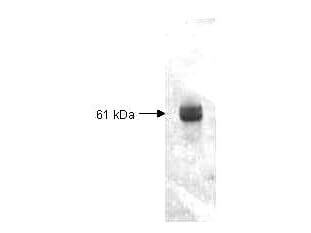Anti-CARBOXYPEPTIDASE Y (RABBIT) Antibody
Carboxypeptidase Y Antibody
- SPECIFICATION
- CITATIONS
- PROTOCOLS
- BACKGROUND

| Host | Rabbit |
|---|---|
| Conjugate | Unconjugated |
| Target Species | Saccharomyces cerevisiae |
| Reactivity | Saccharomyces cerevisiae |
| Clonality | Polyclonal |
Application
| WB, E, I, LCI |
| Application Note | Anti-Carboxypeptidase Y has been tested by western blot and is suitable to be assayed against 1.0 µg of Carboxypeptidase Y [Baker’s Yeast] in a standard ELISA using Peroxidase conjugated Affinity Purified anti-Rabbit IgG [H&L] (Goat) code #611-1302 and (ABTS (2,2’-azino-bis-[3-ethylbenthiazoline-6-sulfonic acid]) code # ABTS-100 as a substrate for 30 minutes at room temperature. A working dilution of 1:1,000 to 1:3,000 of the reconstitution concentration is suggested for this product. |
| Physical State | Lyophilized |
| Buffer | 0.02 M Potassium Phosphate, 0.15 M Sodium Chloride, pH 7.2 |
| Immunogen | Carboxypeptidase Y [Baker’s Yeast] |
| Reconstitution Volume | 2.0 mL |
| Reconstitution Buffer | Restore with deionized water (or equivalent) |
| Preservative | 0.01% (w/v) Sodium Azide |
| Gene ID | 855343 |
|---|---|
| Other Names | 855343 |
| Purity | This product was prepared from monospecific antiserum by a delipidation and defibrination. Assay by immunoelectrophoresis resulted in a single precipitin arc against anti-rabbit serum, purified and partially purified Carboxypeptidase Y [Baker’s Yeast]. Cross reactivity against Carboxypeptidase Y from other tissues and species may occur but have not been specifically determined. |
| Storage Condition | Store vial at 4° C prior to restoration. For extended storage aliquot contents and freeze at -20° C or below. Avoid cycles of freezing and thawing. Centrifuge product if not completely clear after standing at room temperature. This product is stable for several weeks at 4° C as an undiluted liquid. Dilute only prior to immediate use. |
| Precautions Note | This product is for research use only and is not intended for therapeutic or diagnostic applications. |
| Name | PRC1 {ECO:0000303|PubMed:3028649} |
|---|---|
| Function | Vacuolar serine-type carboxypeptidase involved in degradation of small peptides (PubMed:8679540). Digests preferentially peptides containing an aliphatic or hydrophobic residue in P1' position, as well as methionine, leucine or phenylalanine in P1 position of ester substrate (PubMed:8679540). Also plays a role in breakdown of the autophagic body and the autophagosome-dependent protein synthesis (PubMed:29514932). Plays a key role in phytochelatin (PC) synthesis from glutathione (GSH) by cleaving the Gly from GSH and form the PC- peptides of the structure (gamma-Glu-Cys)2-Gly (PubMed:17408619). Also involved in resistance to xenobiotics via the degradation of glutathione-S-conjugates (PubMed:19897216). |
| Cellular Location | Vacuole lumen. Note=The vacuolar sorting receptor VPS10 is required for the delivery of ATG42 to the vacuole lumen. |

Thousands of laboratories across the world have published research that depended on the performance of antibodies from Abcepta to advance their research. Check out links to articles that cite our products in major peer-reviewed journals, organized by research category.
info@abcepta.com, and receive a free "I Love Antibodies" mug.
Provided below are standard protocols that you may find useful for product applications.
Background
Carboxypeptidase Y is involved in degradation of small peptides. It digests preferentially peptides containing an aliphatic or hydrophobic residue in P1' position, as well as methionine, leucine or phenylalanine in P1 position of ester substrate. Carboxypeptidase that catalyzes the release of a C-terminal amino acid with broad specificity. It is inhibited by ZPCK.
If you have used an Abcepta product and would like to share how it has performed, please click on the "Submit Review" button and provide the requested information. Our staff will examine and post your review and contact you if needed.
If you have any additional inquiries please email technical services at tech@abcepta.com.













 Foundational characteristics of cancer include proliferation, angiogenesis, migration, evasion of apoptosis, and cellular immortality. Find key markers for these cellular processes and antibodies to detect them.
Foundational characteristics of cancer include proliferation, angiogenesis, migration, evasion of apoptosis, and cellular immortality. Find key markers for these cellular processes and antibodies to detect them. The SUMOplot™ Analysis Program predicts and scores sumoylation sites in your protein. SUMOylation is a post-translational modification involved in various cellular processes, such as nuclear-cytosolic transport, transcriptional regulation, apoptosis, protein stability, response to stress, and progression through the cell cycle.
The SUMOplot™ Analysis Program predicts and scores sumoylation sites in your protein. SUMOylation is a post-translational modification involved in various cellular processes, such as nuclear-cytosolic transport, transcriptional regulation, apoptosis, protein stability, response to stress, and progression through the cell cycle. The Autophagy Receptor Motif Plotter predicts and scores autophagy receptor binding sites in your protein. Identifying proteins connected to this pathway is critical to understanding the role of autophagy in physiological as well as pathological processes such as development, differentiation, neurodegenerative diseases, stress, infection, and cancer.
The Autophagy Receptor Motif Plotter predicts and scores autophagy receptor binding sites in your protein. Identifying proteins connected to this pathway is critical to understanding the role of autophagy in physiological as well as pathological processes such as development, differentiation, neurodegenerative diseases, stress, infection, and cancer.


